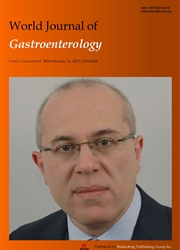

 中文摘要:
中文摘要:
AIM:To assess the potential benefits of mosapride plus proton pump inhibitors(PPIs)in the treatment of gastroesophageal reflux disease.METHODS:A literature search was performed through MEDLINE,EMBASE,and the ISI Web of Knowledge.The clinical trials that compared the benefit of mosapride plus PPI treatment with that of PPI monotherapy were analyzed.The rate of responders was evaluated by the pooled relative risk(PRR)and improvement in symptom scores was assessed by single effect size of a standardized mean,while Hedges’g was used as the effect size.Pooled effect sizes with 95%CIs were calculated using a fixed-effects model.Between-study heterogeneity was assessed using Q test and I2analyses.In addition,studies that assessed the additional efficacy of mosapride in PPI-resistant patients were also reviewed.RESULTS:This systematic review included information on a total of 587 patients based on 7 trials.Four trials compared the efficacy of combination therapy of mosapride plus a PPI with that of PPI monotherapy.The statistical analysis for the effect of additional mosapride showed equivocal results(PRR=1.132;95%CI:0.934-1.372;P=0.205;Hedges’g=0.24;95%CI:0.03-0.46;P=0.023).No heterogeneity and publication bias were found among the studies.Three openlabeled trials assessed the additional efficacy of mosapride in PPI-resistant patients.However,since these trials did not set the control group,the results may be considerably biased.CONCLUSION:Mosapride combined therapy is not more effective than PPI alone as first-line therapy.Whether it is effective in PPI-resistant patients needs to be determined.
 英文摘要:
英文摘要:
AIM: To assess the potential benefits of mosapride plus proton pump inhibitors (PPIs) in the treatment of gastroesophageal reflux disease.
 同期刊论文项目
同期刊论文项目
 同项目期刊论文
同项目期刊论文
 Autonomic functioning in irritable bowel syndrome as measured by heart rate variability A meta-analy
Autonomic functioning in irritable bowel syndrome as measured by heart rate variability A meta-analy Autonomic functioning in irritable bowel syndrome measured by heart rate variability: A meta-analysi
Autonomic functioning in irritable bowel syndrome measured by heart rate variability: A meta-analysi Vagal anandamide signaling via cannabinoid receptor 1 contributes to luminal 5-HT modulation of visc
Vagal anandamide signaling via cannabinoid receptor 1 contributes to luminal 5-HT modulation of visc Effect of clinician-patient communication on compliance with flupentixol-melitracen in functionaldys
Effect of clinician-patient communication on compliance with flupentixol-melitracen in functionaldys 期刊信息
期刊信息
